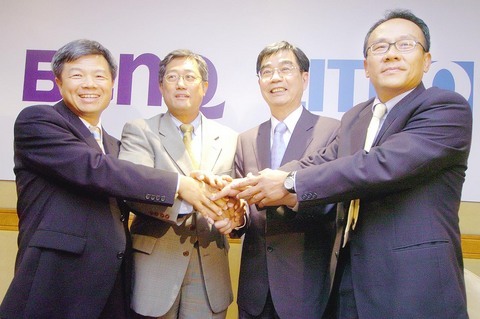BenQ Corp (明基), a leading electronics maker in Taiwan, yesterday said it would sell its optical storage unit, including facilities and patents, to local rival Lite-On IT Corp (建興電子) for NT$1.2 billion (US$37 million) plus a 13 percent stake in the company.
The deal will make BenQ the second-largest shareholder in the nation's biggest optical-drive maker, and lift Lite-on IT's global market share to 27 percent, making it the world's second-biggest optical-drive maker.
The alliance is BenQ's latest move in the re-focusing of its brand operations, and part of its greater efforts to boost profitability and generate more cash flow by streamlining non-core product lines -- which include pulling out of the domestic digital music player market, and the farming out of more production to trim costs.

PHOTO: CHEN TSE-MING, TAIPEI TIMES
"BenQ will focus more on marketing its own-brand products in the future," the company said in a statement released yesterday.
Lite-On IT, the world's No. 5 maker of optical drives, would add BenQ to its client portfolio, which includes Japanese electronics giant Sony Corp. Lite-On IT would also pay an extra small amount of money for BenQ's equipment.
The deal will be closed by June 1, BenQ said.
"We have been adjusting [our non-core business]. We are looking for the optimal operational pattern by concentrating our resources," BenQ chairman Lee Kun-yao (李焜耀) told a press conference yesterday.
But Lee said the deal would not help the company break even ahead of schedule in the final quarter of this year.
The disk-drive unit accounted for just 6 percent of BenQ's total revenues of NT$162.3 billion last year.
"The acquisition of Siemens AG's ailing mobile device unit hastened BenQ's pace in dealing with its non-core businesses as it needs to concentrate on turning around the handset business," said Helen Chen (陳佩君), an analyst with Polaris Securities Co (寶來證券).
The latest restructuring effort means that BenQ would take a more aggressive approach to selling branded cellular phones after fixing its non-core businesses, Chen said.
"This will have a positive impact on BenQ in the long run," she said.
Mobile phones made up half of BenQ's revenues in the final quarter of last year after the purchase of Siemens AG's handset unit last July. The firm posted pre-tax losses of NT$5.3 billion, or NT$2.16 a share, for last year, dragged down by the handset unit.
For Lite-On IT, the transaction would help the company reduce the erosion of the price of DVD recorders after it receives BenQ's orders, Chen said.
The deal is expected to boost Lite-On IT's revenues for this year from between NT$5 billion to NT$10 billion, Lite-On IT president Danny Liao (廖學福) said. Last year, Lite-On IT posted around NT$50 billion in revenues.
Shares in BenQ and Lite-On IT rallied by 1.27 percent and the 7 percent daily limit, respectively, to reach NT$27.85 and NT$41.35 on the Taiwan Stock Exchange yesterday.

Macronix International Co (旺宏), the world’s biggest NOR flash memory supplier, yesterday said it would spend NT$22 billion (US$699.1 million) on capacity expansion this year to increase its production of mid-to-low-density memory chips as the world’s major memorychip suppliers are phasing out the market. The company said its planned capital expenditures are about 11 times higher than the NT$1.8 billion it spent on new facilities and equipment last year. A majority of this year’s outlay would be allocated to step up capacity of multi-level cell (MLC) NAND flash memory chips, which are used in embedded multimedia cards (eMMC), a managed

CULPRITS: Factors that affected the slip included falling global crude oil prices, wait-and-see consumer attitudes due to US tariffs and a different Lunar New Year holiday schedule Taiwan’s retail sales ended a nine-year growth streak last year, slipping 0.2 percent from a year earlier as uncertainty over US tariff policies affected demand for durable goods, data released on Friday by the Ministry of Economic Affairs showed. Last year’s retail sales totaled NT$4.84 trillion (US$153.27 billion), down about NT$9.5 billion, or 0.2 percent, from 2024. Despite the decline, the figure was still the second-highest annual sales total on record. Ministry statistics department deputy head Chen Yu-fang (陳玉芳) said sales of cars, motorcycles and related products, which accounted for 17.4 percent of total retail rales last year, fell NT$68.1 billion, or

In the wake of strong global demand for AI applications, Taiwan’s export-oriented economy accelerated with the composite index of economic indicators flashing the first “red” light in December for one year, indicating the economy is in booming mode, the National Development Council (NDC) said yesterday. Moreover, the index of leading indicators, which gauges the potential state of the economy over the next six months, also moved higher in December amid growing optimism over the outlook, the NDC said. In December, the index of economic indicators rose one point from a month earlier to 38, at the lower end of the “red” light.

MediaTek Inc (聯發科) shares yesterday notched their best two-day rally on record, as investors flock to the Taiwanese chip designer on excitement over its tie-up with Google. The Taipei-listed stock jumped 8.59 percent, capping a two-session surge of 19 percent and closing at a fresh all-time high of NT$1,770. That extended a two-month rally on growing awareness of MediaTek’s work on Google’s tensor processing units (TPUs), which are chips used in artificial intelligence (AI) applications. It also highlights how fund managers faced with single-stock limits on their holding of market titan Taiwan Semiconductor Manufacturing Co (TSMC, 台積電) are diversifying into other AI-related firms.